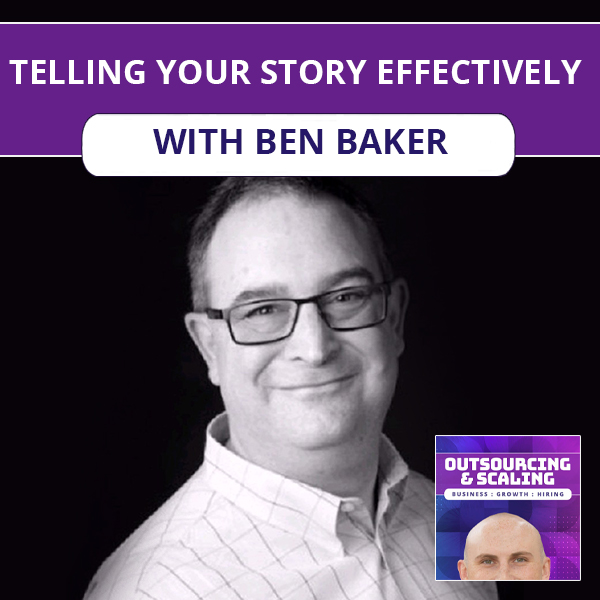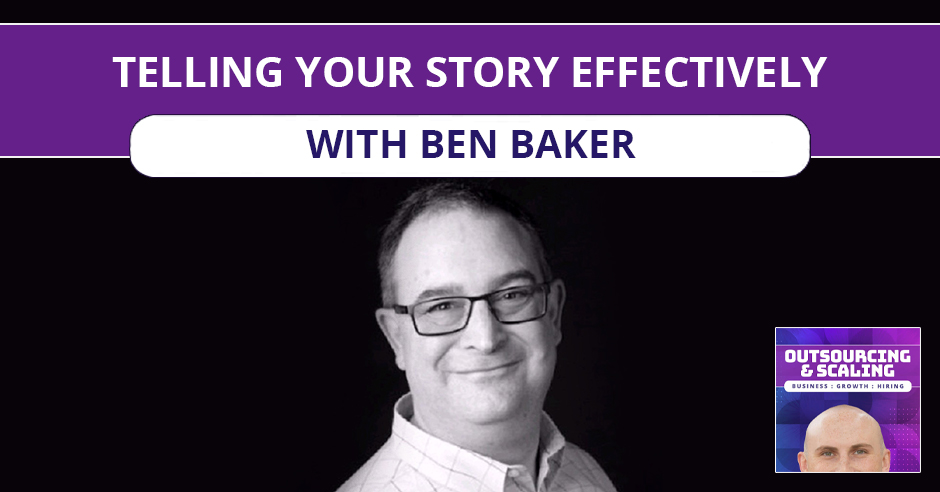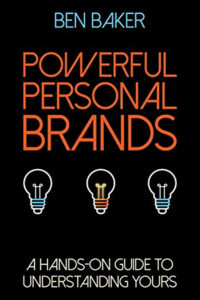


Great companies communicate and live their mission, vision, and values. Ben Baker truly believes in this. The Founder of Your Brand Marketing and the creator of the Lead at Any Level Workshop series, Ben has been helping companies across North America to understand their value and enabling them to tell their stories effectively. On today’s episode, he joins Nathan Hirsch to share how he got into branding and marketing, hiring freelancers and bringing in the right people, and why the story is so important for entrepreneurs.
—
Listen to the podcast here:
[smart_track_player url=”https://www.podetize.com/statsapi/www.podetize.com/wp-content/uploads/fileuploads/11-5b145ef137b51b3d1af0633e9305c43d/02/2020/699c496838ef4a8c1d2487f2c48d7142.mp3″ title=”Telling Your Story Effectively With Ben Baker” artist=”Nathan Hirsch” image=”https://freeup.net/wp-content/uploads/2019/04/OAS.png” ]
Download the audio file here.
Telling Your Story Effectively With Ben Baker
My guest is Ben Baker. Ben, how are you doing?
I am doing great.
For those of you that don’t know, for many years, Ben has been helping companies across North America to understand their value and enabling them to tell their stories effectively both internally and externally. Ben is the Founder of Your Brand Marketing and the Creator of the Lead at Any Level Workshop series. His goal is to help mid to large B2B companies engage, retain and grow their most valuable asset – their contractors. He is the author of the extremely popular book, Powerful Personal Brands: A Hands-On Guide to Understanding Yours and he’s in a process of writing his next book, Humanizing Your Corporate Brand. We’re going to talk all about that but first, let’s take a gigantic step back. As a kid growing up, were you a straight-A student? Were you a rebel?
I was not a straight-A student. I was a solid B-student. I was the kid in school that asked those tough questions that got the teacher either furious at me or scratching their head, reaching for a book to try to figure out what I was talking about. My goal in life as a student always was to be provocative, to always be the one who was asking that hard question, to be the one who was always looking for a better different answer. Quite honestly, if I had tried to get into university now with the grades that I had back then, I’d be going to a small college for a couple of years to upgrade my education before they would let me in. It is what it is. I learned a lot more. What I learned was it’s far more important for me to be inquisitive, push boundaries, and not take everything for granted than it was to be the person who stood there nodding their head and say, “Is that going to be the test?” Write it down, take the test and get the A. That never was me.
Can you tell us a little bit more about your story? How you’ve gotten to entrepreneurship and how you got into branding and story?
Entrepreneurship is easy. My dad was an entrepreneur. My dad had a couple of companies. Some did well, some didn’t do well. What I learned from him is that you learn from your mistakes. It was always the fact that he controlled his own destiny. Good, bad or ugly, he always controls his own destiny. He decided the hours, the days, and the customers that he was going to work for. I grew up working on his construction site. He had a commercial renovation business. The note that was always put inside my head was, “Whatever it takes, take care of the client.” That’s the important thing. The client is the one who pays the bills. They are the ones that take care of it. In the end, we figure out what we need to do to make it right for them.
I watched him do that and the journey is quite interesting. I got out of university. I ran the mainframe at the University of Victoria. I set up the first Mac lab there in 1987. I was a bit of a computer geek and I spent the first five or ten years out of university in high tech. I enjoyed it. I had a good time and built my way up the ladder. I was mostly in sales, but I got to a point where I was on the plane 200 days a year. It killed me. I started looking at myself going, “Is this what I want to be doing? Do I want to be on a plane 200 days a year?” This is about the time I got married. My wife and I looked at each other and said, “This is a divorce waiting to happen. Let’s figure out what we need to do.” I looked at other high-tech sales jobs and they were all 150 days, 180 days on the road. This isn’t what I want to do. I went and I took the “What do you want to be when you grow up?” training. I sat down with an industrial psychologist and had them run me through a battery test. What he said was, “Ben, you’re good at getting people to trust you. You’re good at building vision and value for people. Marketing may be something that you want to take a look at.” I went, “Okay.” I looked into it and made a couple of stumbles and stops.

I don’t know if everybody remembers Kinko’s. I ran Kinko’s for Western Canada on the corporate side for a few years. I ran into a guy by the name of Greg Durst and this is 1999. Greg had a company that was a print management firm. You walked into his door and you got a desk and a set of business cards and you ran your own business inside of his operation. We had 30 staff and 5,000 square feet of warehouse. We had full-time designers, shippers, and all those types of people. My clients were large commercial companies that were looking for someone to help them tell their story. We did everything from direct mail to get into web development in 1999, the heady days. I started into social media marketing, promotional marketing, trade show development, and it went from there.
In 2007, Greg was making noise about closing down the company. He didn’t want to sell it to me for whatever reason, but that’s fine. He wanted to sell it to his kid and his kid didn’t want the company. I think he ended up shutting it down. I decided it was time to go out on my own. It was a perfect time. My clients were receptive to it. It was January 2008, the absolute worst time to start your own company, smack dab in the middle of the recession. I had clients that believed in me. I had vendors that believed in me and they extend me lines of credit. They worked with me and years later, here we are.
I can relate too. A few years ago, I thought I would get into guest speaking. I took a little masterclass on and I hired a coach and that was the first coach I’ve ever hired. When I was done, I got offered different speaking gigs. It was great for FreeUp. After being on plane ride after plane ride and hotel after hotel, I was like, “There’s got to be a more effective way to grow FreeUp.” I enjoy on a day-to-day business and missing my fiancé and my dogs. Everything factors into play. I love that story and I feel like all entrepreneurs are like that. They get off on their own. They’re trying different things and seeing what works. I want to talk to you about your mentality when it comes to marketing. You talked about your dad taking care of the customer and you are good at building trust. Are there some overall beliefs you have in terms of engaging people and treating people right?
My attitude is to work on the problem. People don’t care if you make a mistake. People care about how you fix it and that you’ll own up to it. You sit there and go, “We made a mistake. This is what it is. How can we fix it? How can we make things better for you?” I’ve always believed that my clients have been with me as long as they have because they know whatever happens, wherever the problem is, we’ll fix it. Things go right 99% of the time. You take on a project, you work through the problem, you do the strategy, you figure it out and it goes well. Every once in awhile, things happen. A vendor lets me down, something happens in the economy, something happens on their side.
It’s sitting there going, “How do we pivot and work through this now that we’re in this situation?” Instead of avoiding the situation, not returning phone calls, not returning emails and saying, “It’s your fault, not my fault.” My attitude is to work with the client and figure it out. Clients will be very reasonable in those situations and they’ll work through it. I’ve gotten far more clients out of it because of that relationship and that philosophy of business than just sitting there going, “Sorry, you signed off on the proof. That’s your fault. Pay the bill.”
We’ve had clients and in the first six months of any startup, you’re figuring stuff out and mistakes happen. We have clients where that first month may have not gone the way that we wanted or the way that they wanted. Because we made it right, we fixed it and we adjusted our systems, our processes to make sure that it didn’t happen again, they’re still with us. I can relate. Let’s talk about hiring. I feel like the geek in me is coming in hard into the marketing space. We work with a ton of marketing agencies and marketing influencers. How do you use virtual assistants and freelancers in your business? What has been your experience?
95% of the people that we hire are freelancers. We hire subcontractors all day, every day. My attitude is I can’t know everything, I can’t do everything, and I can’t be an expert at everything. I’d rather be lean and mean, be able to pivot and bring in the right people for the right job than say, “I’ve hired these twelve people. Now I’ve got to keep them busy.” They may not be the right designer for that particular project. Since they’re the ones that are free, that’s what we’ve got to use. My philosophy is to bring the right people to the table for the right job. That’s what I like about using a subcontractor or freelance. It’s a business relationship. You hire them because of their expertise. You pay them what they’re worth because of their expertise. You build a relationship. Hopefully, you can go back to them time and time again and work with them on other clients. I don’t have the payroll issues. I don’t have the hiring issues. I don’t have the firing issues. It’s a better way for me to run my company.

What tips do you have for people that are getting into hiring freelancers for the first time or they’ve struggled to hire freelancers before? What would you tell them?
Be very clear about what you need. What’s the project? Communicate. If you can’t tell this person exactly what you need them to do, you’re in trouble because they cannot read your mind. Be open with them. If they’ve got issues, let them talk to your clients. If they go behind your back, you’ll never use them again. It’s one of these things, trust people. Only work with people you trust. Only bring in people that you’re willing to sit there and shake a hand with. If you can’t do that, it’s not worth bringing them in because these people are the people that you’re trusting with your clients. You need to make sure the people are the right people who know what they can do and you know that they’re going to take care of people your way.
What about handling issues where you define the scope and things are not getting done the exact way that you wanted? How do you go about getting that project back on the right path? How do you figure out, “Should I keep this person more chances or is it time to move on?”
It all comes down to communication. First of all, never blame the freelancer. If something goes wrong with a client, you’re the one who hired this person. You’re responsible for your client. Your client could care less, whether it’s a contractor or freelance. They hired you and they trusted you. Your job is to make sure that the person does whatever they need to do behind the scenes and do it right. It’s open communication saying, “This isn’t going well. How are we going to fix this? This is what I need, can you do this?” If they can’t do that, then you need to bring in somebody who can. You need to be clear, open and upfront about it because people will always say, “I can do that.” I go, “Can you do it? Show me that you could do it before I’m going to bring a client on board.” That’s what we need to be able to bring people on board that have a clear definition of what you need out of life and for your clients
Are you hiring mostly US freelancers or non-US freelancers or a combination?
My business is in Canada. My freelancers are in North America. I don’t bring in people from the Philippines. I don’t bring people in from South America. I hire people in North America. A lot of it has to do with skillset and timelines. I want people who understand the psychology of the North American business. They’ve been in North American business and they understand what needs to be done. The people I bring intend
to be people that are North America based.
Let’s talk about the story. Why is the story so important for entrepreneurs?
The story is important for entrepreneurs because it’s a hook. It allows people to understand who you were, who you are, and where you’re going. It gives people a reason to trust you. It’s what defines you and what makes you different. If you’re the same as everybody else, you’re telling the same story, you look the same, you feel the same, you smell the same, what makes you valuable? If you have a story that allows people to say, “That’s why I should trust this person. Let’s go.”
What are some mistakes you see people make with their stories?
It’s not authentic. They try to be more than who they are. They try to fabricate this wonderful story based on who they want to be versus who they are.
People can see right through that.
People see through that all the time. They say, “You want to deal with $100 million accounts, but you’re not quite there yet.” That’s okay.
People understand failure. People like a story that isn’t just straight up.
Nobody has a path to success that’s straight up. Richard Branson or any of these people that you can think of. None of them has a story that’s this hockey stick rise to success. Everybody has failures, setbacks and things that make them go, “I shouldn’t have done that.” That’s what makes us stronger.
What else should people know about stories?
Stories don’t have to be these long elaborate things. A story can be told in a minute. You can have a one-minute version, five-minute version or ten-minute version. It’s a matter of understanding that the story you tell has to be authentically you. It has to be something that’s going to resonate with your audience. It has to be in their language. It has to be something that they want to listen to, they’re going to understand and they’re going to see value in.

Where can people find out more about you and what are you most excited about?
The best way to get in touch with me is through my website, YourBrandMarketing.com. People can email me at Ben@YourBrandMarketing.com. We’re spending a lot of time doing workshops and keynote addresses on how to engage contractors effectively. How do we engage them, how to retain them and how to grow them? It’s called the Lead at Any Level Workshop series. It’s teaching how to stop being yet another contractor but how to be a linchpin. In the words of Seth Godin, “How to be a linchpin?”
Thanks so much for coming on.
Thanks for having me.
Important Links:
- Your Brand Marketing
- Lead at Any Level Workshop series
- Powerful Personal Brands: A Hands-On Guide to Understanding Yours
- YourBrandMarketing.com
- Ben@YourBrandMarketing.com
About Ben Baker
 For the last 25 years Ben has been helping companies across North America understand their value and enabling them to tell their story effectively both internally and externally.
For the last 25 years Ben has been helping companies across North America understand their value and enabling them to tell their story effectively both internally and externally.
Ben Baker is the founder of Your Brand Marketing and the creator of the Lead At Any Level Workshop series.
His goal is to help mid to large-sized business to business companies engage, retain and grow their most valuable asset. . . their employees.
He is the author of the extremely popular “Powerful Personal Brands: a hands-on guide to understanding yours” and is in the process of writing his next book, “Humanizing Your Corporate Brand.”
Ben has his own nationally syndicated show on IHEART and Spotify called the YourLIVINGBrand.live show and lives in Richmond, BC, just outside of Vancouver, with his wife and son.
